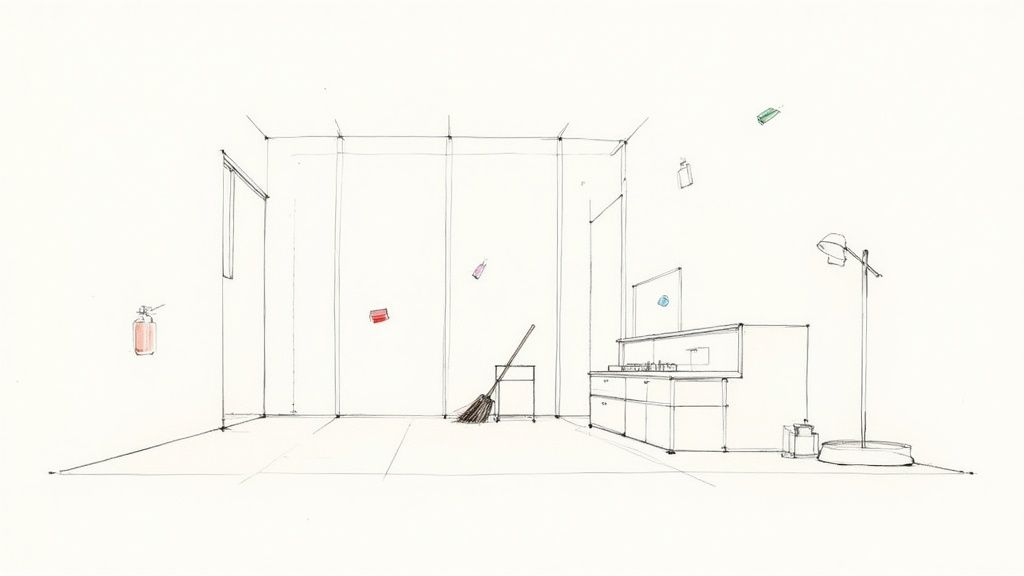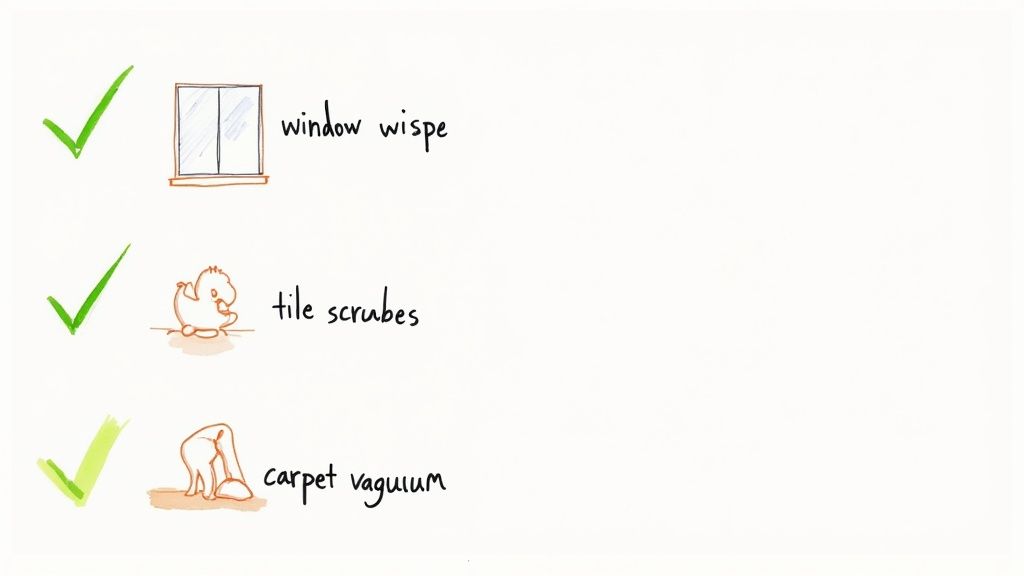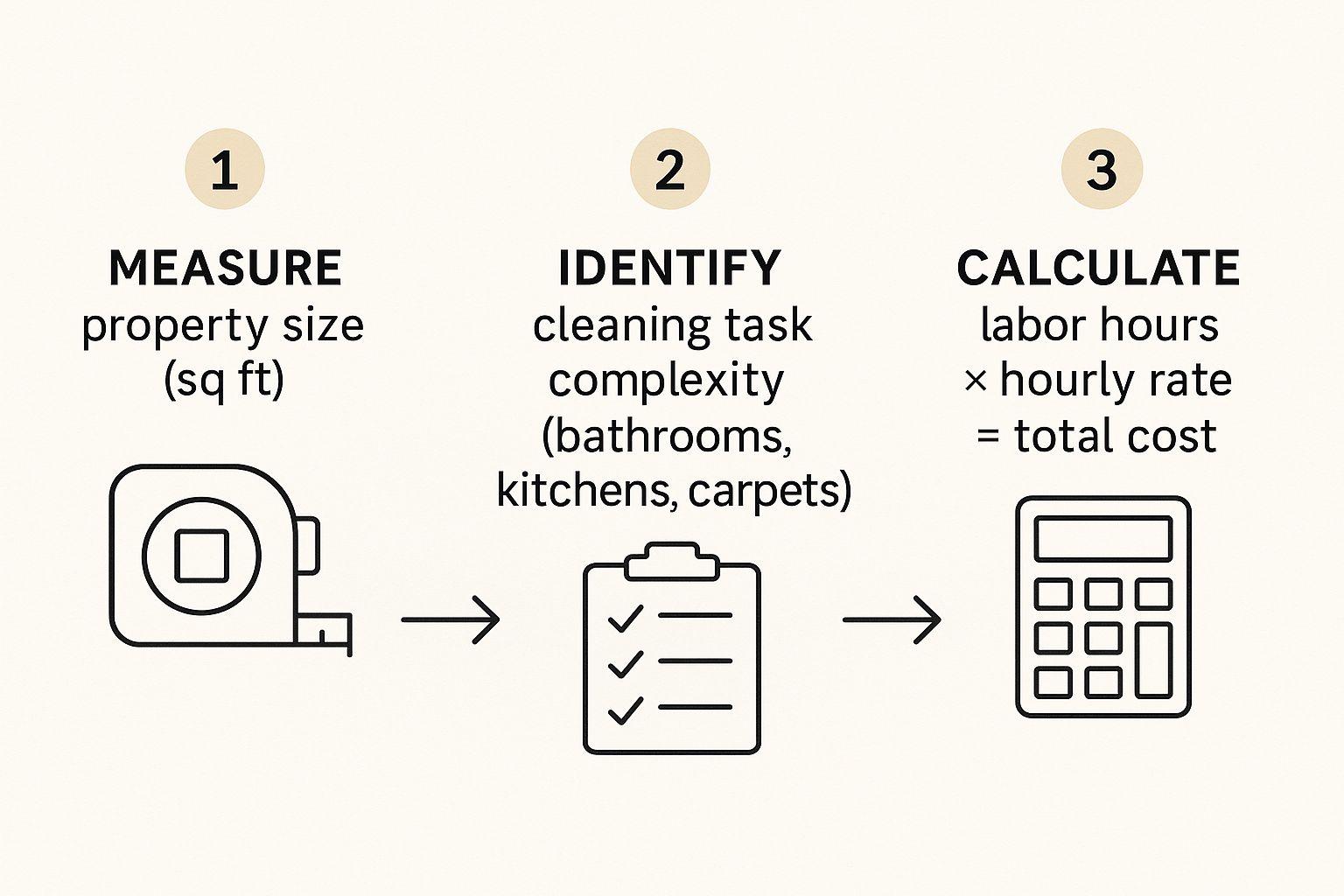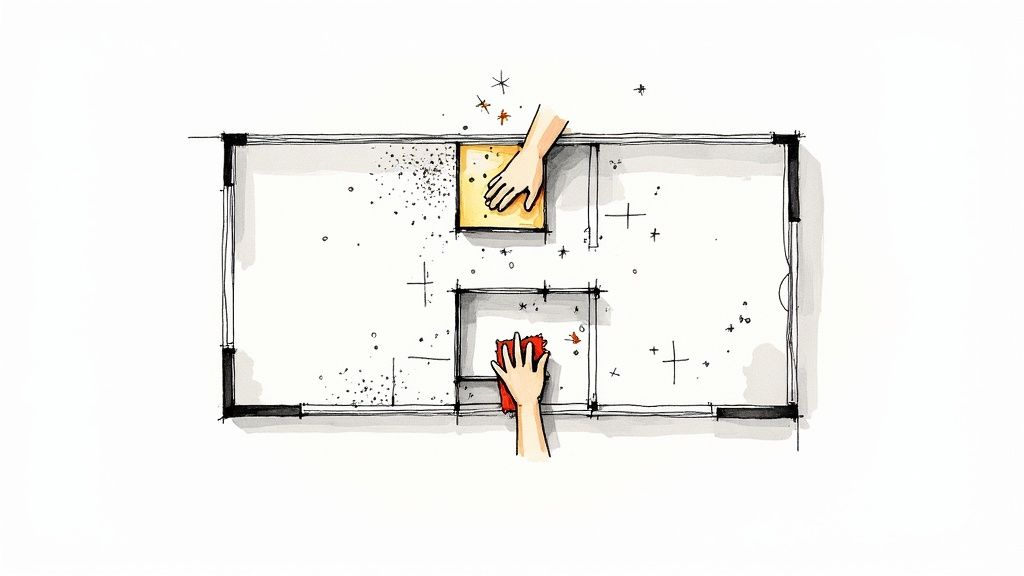When your tenancy agreement comes to an end, the last thing on your mind is probably cleaning. But this final step, known as an end of tenancy clean, is one of the most important parts of moving out. Think of it as hitting the ‘factory reset’ button for the property. Its main job? To get your security deposit back in full.
The True Meaning of an End of Tenancy Clean
This isn't your average weekly spruce-up. An end of tenancy clean is a completely different beast. It's an intensive, deep-cleaning marathon designed to satisfy the eagle eyes of landlords and letting agents, who will compare the property's final state to the initial inventory report.

It goes way beyond just vacuuming and wiping surfaces. We’re talking about tackling the built-up grime in all those spots you might normally overlook. Getting this right is a crucial part of the moving process and has a direct impact on your finances.
For tenants, this thorough clean is your ticket to getting that deposit back without any deductions. In the UK, the cost for a professional service can be anywhere from £170 to over £415, which really depends on the size of your home and where you live. You can discover more insights about professional cleaning prices and get a better idea of what to expect.
Standard Clean vs. End of Tenancy Clean: A Quick Comparison
To really grasp the difference, let’s put the two side-by-side. Your regular clean is about maintenance—keeping things tidy. An end of tenancy clean is about restoration—bringing the property back to its original condition. The level of detail required is worlds apart.
The core goal is simple: leave the property in such a pristine state that the next tenants can move in immediately without any cleaning complaints. It’s about erasing any trace of your occupancy.
This table breaks down exactly what that means in practice.
| Cleaning Task | Standard Clean | End of Tenancy Clean |
|---|---|---|
| Oven Cleaning | Exterior wipe-down only | Full internal and external degreasing, including racks and hob |
| Kitchen Cupboards | External wipe-down | Cleaned inside and out, including tops and handles |
| Skirting Boards | Light dusting if visible | Dusted and wiped down in every room |
| Appliances | Exterior wipe-down | Pulled out and cleaned behind (e.g., fridge, washing machine) |
| Windows | Basic interior wipe | Cleaned inside, including sills and frames |
| Limescale Removal | Not typically included | Full descaling of taps, showerheads, and tiles |
As you can see, the end of tenancy clean is far more exhaustive. It's a systematic process that leaves no stone unturned, ensuring every nook and cranny is spotless.
Why This Clean Is Crucial for Your Deposit
Let’s be honest, nobody enjoys the process of moving out. But amidst the chaos of packing boxes, there's one final task that can make or break your bank balance: the end-of-tenancy clean. Its main purpose is simple but critical: to get your full security deposit back.
When you hand back the keys, your landlord or letting agent will go over the property with a fine-tooth comb, comparing its current state to the check-in inventory report. Any difference in cleanliness gives them a legitimate reason to deduct money from your deposit. It’s a common misconception to see the deposit as just another rental fee; it’s your money, held in trust, and you have every right to get it back by upholding your end of the bargain.
The Financial Logic of a Professional Clean
It’s easy to look at the cost of a professional clean and think of it as just another moving expense. But that's the wrong way to look at it. Think of it more as an insurance policy for your deposit. The reality is, disputes over cleaning are far and away the most common reason tenants lose out.
In fact, a staggering 56% of all deposit disputes in the UK boil down to disagreements over the property's cleanliness. With the average deposit in our area hovering around £1,321, a landlord's deductions for cleaning can easily climb from £250 to £500. You can see a detailed breakdown of the costs versus deposit returns to understand the numbers better.
When you put it that way, spending a fraction of that amount on a guaranteed professional job suddenly makes perfect sense. It’s a smart, calculated move that prevents a simple oversight from becoming a very expensive mistake.
An end of tenancy clean is less about housekeeping and more about financial risk management. It's the final step that closes the loop on your rental agreement, ensuring you walk away with your full deposit intact.
Ultimately, this clean isn't just about ticking a box in your tenancy agreement. It’s a shrewd financial decision, especially when moving is already so expensive. It ensures you don't lose hundreds of pounds over something as preventable as a grimy oven or dusty skirting boards.
Your Ultimate Room-by-Room Cleaning Checklist
To get a real sense of what an end-of-tenancy clean actually involves, it helps to see it broken down room by room. This is so much more than your average weekly tidy-up; think of it as a top-to-bottom deep clean designed to make the property look as good as it did the day you moved in. An inventory clerk or landlord will go through each room with a fine-tooth comb, and this checklist covers the exact things they’ll be looking for.

Whether you're gearing up to do the work yourself or planning to call in the professionals, knowing what's expected is half the battle. It’s always the little details that catch tenants out and end up costing them part of their deposit.
The Kitchen: The Heart of the Clean
The kitchen is, without a doubt, the most challenging and heavily scrutinised room in any rental property. It’s the epicentre of grease, food splatters, and daily grime, which makes it the most time-consuming part of the job.
- Oven and Hob: This is the big one. The oven needs a full deep clean, inside and out. That means getting every last bit of grease off the glass door, racks, and trays. The hob must be scrubbed free of any burnt-on food and polished to a shine.
- Appliances: Don't forget the fridge and freezer. They need to be completely empty, defrosted, and wiped down. The dishwasher filter has to be cleaned out, and the washing machine drawer needs a good scrub to get rid of any mould or old soap scum.
- Cupboards and Drawers: Every single cupboard and drawer has to be emptied and cleaned from the inside out. Remember to wipe down the tops of the wall cupboards, too—it's an easy spot to miss!
- Surfaces and Sink: All worktops must be degreased and properly sanitised. The sink and taps should be descaled and polished until they gleam, making sure the plughole is clear of any gunk.
Bathrooms and Living Areas
Next up are the other high-traffic spots, which come with their own unique cleaning hurdles like limescale in the bathroom and dust everywhere else. These spaces need to feel completely fresh for the new tenants walking in.
Bathrooms, for example, are a breeding ground for mould and limescale. All the tiles and grout need a thorough scrub, shower screens must be descaled and polished, and the toilet has to be sanitised from top to bottom—including around the back. The extractor fan needs to be cleared of dust as well.
What tenants often need to realise is that "clean" in this context means getting every single surface back to its original condition. This includes scrubbing marks off walls, cleaning light fittings, and making sure all the skirting boards are free from dust and scuffs.
For those really persistent marks, you might need a bit more know-how. We've put together some great advice in our guide on how to remove stubborn stains, which has practical tips for all sorts of common household spots.
Finally, every living area and bedroom demands the same level of care:
- Dusting: Every surface needs dusting, from the light fittings and curtain rails right down to the skirting boards and plug sockets.
- Windows: All internal windows, sills, and frames must be cleaned until they are streak-free.
- Floors: Carpets need a very thorough vacuum, and hard floors should be swept and mopped. Sometimes, a professional carpet clean is even written into the tenancy agreement.
- Furniture: If the property came furnished, all furniture needs to be wiped down. Don't forget to lift the cushions on sofas and armchairs to vacuum underneath.
Choosing Between a Professional Service and DIY
It’s the classic tenant’s dilemma: do you roll up your sleeves and tackle the end-of-tenancy clean yourself, or do you call in the professionals?
The DIY route often looks like the cheaper option on the surface. But it's easy to underestimate what's involved. You're not just looking at a few hours of work; it's a huge time commitment, requires a whole host of specific cleaning products, and demands an almost obsessive level of detail.
Even if you spend an entire weekend scrubbing, there's always the risk that you'll miss something a sharp-eyed inventory clerk will spot. This can lead to frustrating disputes and, ironically, deductions from your deposit that end up costing more than a professional clean would have in the first place.
On the flip side, hiring a professional service is really about buying peace of mind. It frees up your time and energy when you need it most—during a stressful move. You get the benefit of their experience, their professional-grade equipment, and, most importantly, their understanding of exactly what landlords and letting agents are looking for.
The Guarantee That Protects Your Deposit
The game-changer when you hire a professional team is the guarantee. Any reputable company will offer to come back and fix any cleaning-related issues flagged by your landlord or agent, typically within a 48 to 72-hour window.
Think of this guarantee as an insurance policy for your security deposit. The responsibility for passing that final, meticulous inspection shifts from your shoulders to theirs. It's a powerful safety net.
So, if the inventory check notes a dusty skirting board or a smear on a window, the cleaners return to sort it out at no extra charge to you. For many tenants, this assurance alone is worth the cost, ensuring a smooth handover and a full deposit return.
The cost of a professional clean isn't just a random number; it's usually calculated based on the size of your property and the specific tasks required to get it back to standard.

To help you decide what's right for you, let's break down the two options side-by-side.
Hiring a Professional vs. DIY End of Tenancy Cleaning
| Factor | Professional Cleaning | DIY Cleaning |
|---|---|---|
| Deposit Return | High likelihood of full return, backed by a service guarantee. | Risky. Missed spots can lead to costly deductions. |
| Time & Effort | Frees up your time entirely during a busy move. | Extremely time-consuming; can take several full days. |
| Cost | Upfront cost for the service. | Lower initial outlay, but you must buy all supplies. |
| Equipment | Uses industrial-grade equipment and specialised products. | Relies on standard domestic cleaning tools and products. |
| Stress Level | Minimal stress. The responsibility lies with the company. | High stress, with pressure to meet exacting standards. |
| Quality | Consistent, professional standard designed to pass inspection. | Quality can be inconsistent and may not meet agency standards. |
Ultimately, while the DIY approach has its appeal, the convenience, security, and guaranteed results often make hiring experts the smarter choice for many Oxford residents.
If you're ready to see just how simple it can be, you can get an instant quote and schedule your professional clean online.
What Goes Into the Cost of an End of Tenancy Clean?
Let's be honest, moving is expensive, and budgeting for it can feel like a real headache. One of the biggest question marks is often the end of tenancy clean. It’s easy to wonder where the numbers on a quote actually come from, but the final price isn't just plucked out of thin air. It’s a careful calculation based on the specific work your property needs.
The biggest driver of the cost is, unsurprisingly, the size of your property. A snug studio flat is a completely different job from a large four-bedroom family home, and the price will reflect that. The number of bathrooms is also a huge factor – they are notoriously time-consuming, needing serious attention to detail for descaling, scrubbing, and sanitising every nook and cranny.
Then there's the starting condition of the place. If you've kept on top of things, the cleaners can get the job done more efficiently, which keeps the cost down. On the other hand, a property that needs a lot more elbow grease to cut through built-up grime or tackle stubborn stains will naturally require more time and a bigger budget.
The Nitty-Gritty: Key Factors Behind Your Final Quote
Your postcode plays a part, too. Running a business in a major city costs more, and that's reflected in the pricing. In a competitive rental market like London, for example, the average cost for a professional end of tenancy clean often lands around £250 or more. For a closer look at how prices vary, it’s worth checking out a detailed guide on London end of tenancy cleaning prices to see how different factors come into play.
It helps to think of the price as a direct reflection of the work required. This isn’t just a quick wipe-down; it’s about meticulously bringing the property back to the high standard that letting agents and landlords demand.
Finally, the price will change if you need any extra services. These are the add-ons that aren’t always included in a standard clean but might be necessary to get your full deposit back:
- Professional Carpet Cleaning: A must for getting rid of deep-down dirt, odours, and stains that a regular vacuum just can't touch.
- Upholstery Sanitation: Crucial if you’re leaving a furnished property and need the sofas and armchairs properly cleaned.
- Exterior Window Washing: Sometimes this is explicitly mentioned in the tenancy agreement, so it's worth checking.
Getting a handle on these variables makes it much easier to understand your quote and plan your moving budget without any nasty surprises.
Got Questions About Your Final Clean?
Even the most organised move can throw up some last-minute questions. To help you feel completely on top of things, we’ve put together answers to the queries we hear most often from tenants about the final clean. Think of it as your go-to guide for those nagging doubts.

Getting these practical details straight can be the difference between a frantic handover and a smooth, stress-free move. It’s all about knowing what to expect.
How Long Does an End of Tenancy Clean Take?
This is a world away from your usual weekly spruce-up. For a studio flat, a professional team of two might spend 3-4 hours, but a three-bedroom house could easily take a full day's work, often clocking in at 6-8 hours or more.
The final timing really boils down to two things: the property’s size and its condition when the cleaners arrive.
Do I Need to Provide Any Cleaning Supplies?
Nope, not a thing. A good professional company turns up with a van full of industrial-grade equipment and specialist cleaning products. This isn't just a bit of bleach and a cloth; we’re talking powerful steam cleaners for carpets, and specific solutions designed to obliterate tough limescale, baked-on grease, and stubborn stains that your supermarket sprays won't touch.
The real advantage of hiring a professional service is their arsenal and expertise. They know exactly what letting agents look for and have the right tools to get the job done efficiently.
This means every nook and cranny is cleaned to a professional standard, and you don’t have to buy or rent a single piece of gear.
Can My Landlord Force Me to Use Their Preferred Cleaner?
Absolutely not. In the UK, the Tenant Fees Act 2019 is crystal clear on this point. It makes it illegal for landlords to insist you use a specific cleaning company as part of your tenancy agreement.
Your only legal duty is to return the property in the same state of cleanliness as it was when you moved in. This gives you total freedom to:
- Hire any professional service you like.
- Do the clean yourself, provided you can hit that same high standard.
What Happens If My Landlord Still Isn't Happy?
This is where a professional service really proves its worth. Most reputable companies offer a guarantee, usually for 48-72 hours, after they’ve finished. If your landlord or letting agent raises any cleaning-related issues during the check-out inspection, the company will pop back and sort them out at no extra charge.
This guarantee, backed up by a detailed invoice, is solid proof if you need to challenge any deposit deductions. For more tips on tenant rights and responsibilities, check out the expert advice on the Signal Cleaning blog.

Leave a Reply